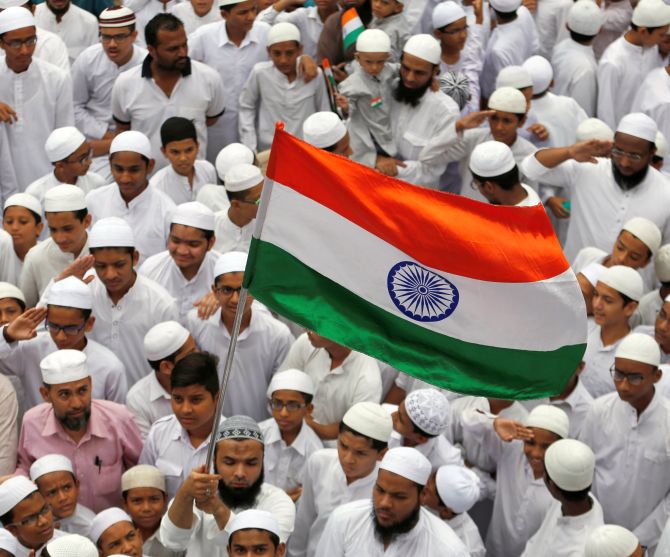Since the 1990s, the primary impulse for Muslims has been ‘survival’, not ‘existence’
By Abdulhafiz lakhani Ahmedabad
After recent Babri Masjid Verdict by SC, Muslims are openly speaking against Congress for this decades old controversy as Rajiv Gandhi, then PM of country opened the gate of this so called Mandir at that time. Congress is undoubtedly responsible for this mess up at the same time Muslim leadership is also in dock for such contentious situation.
In contrast, look at what was lost. The chain of events caused by the mobilization of Muslims after the Shah Bano judgement are there for all to see. This led to the immense polarization of Hindus, the like of which never seen in post-Independent India. The argument was that if Muslims can cause a SC judgement to be overturned for their religious feelings, Hindus can equally demand changes to the law of the land, for their religious feelings.
The Hindu consolidation became possible only due to the Muslim mobilization. Rajiv Gandhi had to balance the appeasement of Muslims over Shah Bano with the appeasement of Hindus, and took steps that opened the Babri Masjid issue.
The support for Hindu identity based politics went up. Hindu right wing BJP’s Lok Sabha seat tally increased from 2 to 85. A Rath yatra traversed the cow belt. From the early 90s BJP began winning states. In several states, it maintained successive unbeaten terms.
Later in the 90s, the BJP formed coalitions and came to power. Recently, the BJP became the world’s largest political party in terms of primary membership. And in a mere 30 years, the entire political space has been ceded to the right wing. Today the Head of State and Government are all from BJP – President, Vice President and Prime Minister. As of today, BJP and its allies rule 20 out of 28 states in the country.
It may be that all these things would have happened anyway. And, the stand of Muslims in Shah Bano is not the prime contributor. Co-relation and not causation. May be, but unlikely! In any case, hopefully our rehnumas /leaders learn from this and make choices that are more pragmatic. To be able to see beyond the immediate and to act accordingly is a key function of leadership.
The crisis in the leadership started after the partition. The erstwhile freedom fighters were now the leaders of the two nations, India and Pakistan. The division of the country had left Muslims in turmoil. Majority of the leaders in the country had shifted to Pakistan. There were very few Muslim leaders left to participate in the politics of the country. The crisis which started during the partition was felt in the late 1980s. The wave of communalism against the minorities had started in the 1990s. The demolition of Babri Masjid had left the Muslims clueless. It was more of a psychological shock than a physical shock.
Since the 1990s, the primary impulse for Muslims has been ‘survival’, not ‘existence’. The rise of right-wing parties and the Rashtriya Swyamsevak Sangh or the RSS has put the demand for the minority rights in the backyard. There is a rising pessimism among the Muslims about their possible state in the country. Amid the politics of communalism and hostility for the minorities, the Muslims are just seen as vote banks by the national and regional parties. The purpose of the parties entertaining Muslims vote banks is not to empower them through participation – it is more of an appeasement.
Though the third largest Muslim population resides in India, their current membership of the Indian parliament is at low of 24. The Bhartiya Janta Party (BJP), which is the ruling party in India does not even have a single Muslim in any of the state assemblies. Seeing the communal politics of the BJP, other national parties have also started to adopt soft Hindutva to nurture votes in the elections. When we talk about national leaders from the Muslim community, it is not even a handful.
Muslims are very backward in education and employment, as was noted by the Sachar Committee formed in 2005. Most of the Muslims students go into informal employment than in government services. There are lots of statistics to prove this. Today, the prime purpose of education within the Muslim community is sustenance. Moreover, a large section of Muslims goes into madrassas without any future prospects. Yet another section goes for diploma courses in technology and short-term courses to get jobs in the Middle East. Very few Muslims enter the field of research.
In the current crisis when Muslims are viewed with hostility and treated as second-class citizens, how can we expect leaders with a modern and secular outlook to lead them? In the country which is facing an ever-increasing rate of hate crimes against the Muslims in the form of mob lynchings, the anti-national fracas and the treatment meted to Kashmir, the rise of reactionary politics is obvious. When people say that a certain section of leaders from the Muslim community is communal and myopic, I disagree with the view. The onset of the current leader among the Muslims will always be reactionary. If it arises, it will arise in reaction to the rise of right-wing nationalism – and therefore, it may even be on similar lines as right-wing nationalism.
Uplifting the Muslims in the country would mean nurturing the community from the grassroots level along progressive lines.































